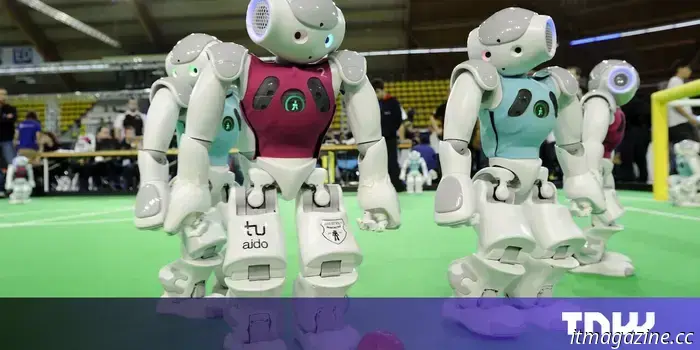
Bananas, champagne, and robots: The importance of humans in automation
Observing robots awkwardly move around, cause pile-ups on the soccer field, and accidentally lose their heads during a 1500-meter sprint at the inaugural Robot Humanoid Games in China was both amusing and a reflection of the progress made in robotics — as well as the distance still to cover.
While humanoid robots continue to have difficulty walking on a stage, automation is quietly transforming industries in various parts of the world. At Picnic Technologies, the fastest-growing online supermarket in the Netherlands, robots are assembling your grocery orders to ensure that delivery ‘shoppers’ can swiftly take them from the warehouse to your refrigerator.
These advancements have allowed the once modest startup to rapidly scale and compete with supermarket giants like Albert Heijn. The company’s CTO, Daniel Gebler, recently revealed the secrets behind Picnic's success during a conversation with TNW founder, Boris Veldhuijzen van Zanten, while driving through Amsterdam in the latest episode of “Kia’s Next Big Drive.”
You can view the full interview — recorded on the way to TNW2025 in Kia’s all-electric EV9 — by clicking on the image below:
Caption: Gebler and Veldhuijzen van Zanten navigating the canals en route to TNW2025.
However, despite Gebler holding a PhD in AI and spearheading large-scale automation, he emphasizes that robots will not completely replace humans.
Previously, Picnic’s ‘shoppers’ had to walk through large warehouses to manually select each item for orders. Now, the company’s fully automated fulfillment centers in the Netherlands and Germany ease the burden (and the number of steps needed by shoppers) by utilizing robotic arms for the item picking process.
At its latest order fulfillment center in Oberhausen, Germany, Picnic can process up to 33,000 online orders daily, serving around 200,000 households. The warehouse operates with 1,500 robots and 1,000 humans. Why? Because certain tasks are still better performed by people.
Bananas and champagne: Robots have difficulty with irregularly shaped items, fragile goods like eggs, or high-value products such as champagne bottles.
Packing efficiency: Humans can easily adjust crates to maximize space, whereas robots need specific layouts and struggle with opening boxes.
Final touches: In highly automated centers, the last step — placing items into a customer’s delivery box — is still done manually.
To navigate these constraints, Picnic employs product whitelisting to determine which orders robots can fulfill. For instance, an order containing bags of chips and heavy soda bottles would be unsuitable for a robot.
So, as robots advance, will they ever fully take over Picnic's warehouse shoppers?
“Absolutely not. As mentioned, it isn’t our goal to replace them; rather, we want to utilize robots to enhance our warehouse's performance. Shoppers remain essential to our operations, with robots supporting their work,” states Picnic software engineer Jhon Mauro Gomez.
In summary, automation enhances Picnic’s speed and efficiency, but it represents a partnership rather than a replacement.
Is AI coming for your boss? (Don’t get your hopes too high)
The emergence of AI is also reshaping the concept of “management” within companies. Gebler suggests that AI won’t entirely eliminate management; instead, it will redefine it.
“Most likely, what we now understand as management won’t be present anymore,” Gebler explained. “The significance of ownership — owning what you create and manage — will become increasingly crucial as everyone becomes a designer, builder, and operator.”
This transition provides teams with greater autonomy and opportunities for experimentation. At Picnic, developers have embraced this freedom to:
Launch return deliveries: Customers can now return retail items from other brands using Picnic’s delivery vans, improving fleet efficiency.
Offer meals, not just items: Families gain more from curated meal packages rather than assembling individual products.
The concept of “AI-free Fridays”
Gebler is also advocating for “AI-free days” — specific times when developers set aside AI tools to enhance their human skills, since while AI can analyze data, it cannot improvise like a human.
Whether in grocery warehouses or corporate boardrooms, the future doesn’t boil down to humans against robots — it’s about humans working alongside robots. Automation excels at performing repetitive and structured tasks, while humans excel in adaptability, creativity, and judgment.
From bananas and champagne to AI-free Fridays, Picnic demonstrates that the future of work is centered on reinvention rather than replacement.
Image credit: “BvOF RoboCup2013 – RoboCup Soccer Nao” by RoboCup2013 is licensed under CC BY 2.0.
Bananas, champagne, and robots: The importance of humans in automation
The CTO of Picnic Technologies explains how robots are conducting grocery shopping in Europe’s largest automated warehouse and discusses the ongoing importance of humans in the process.

